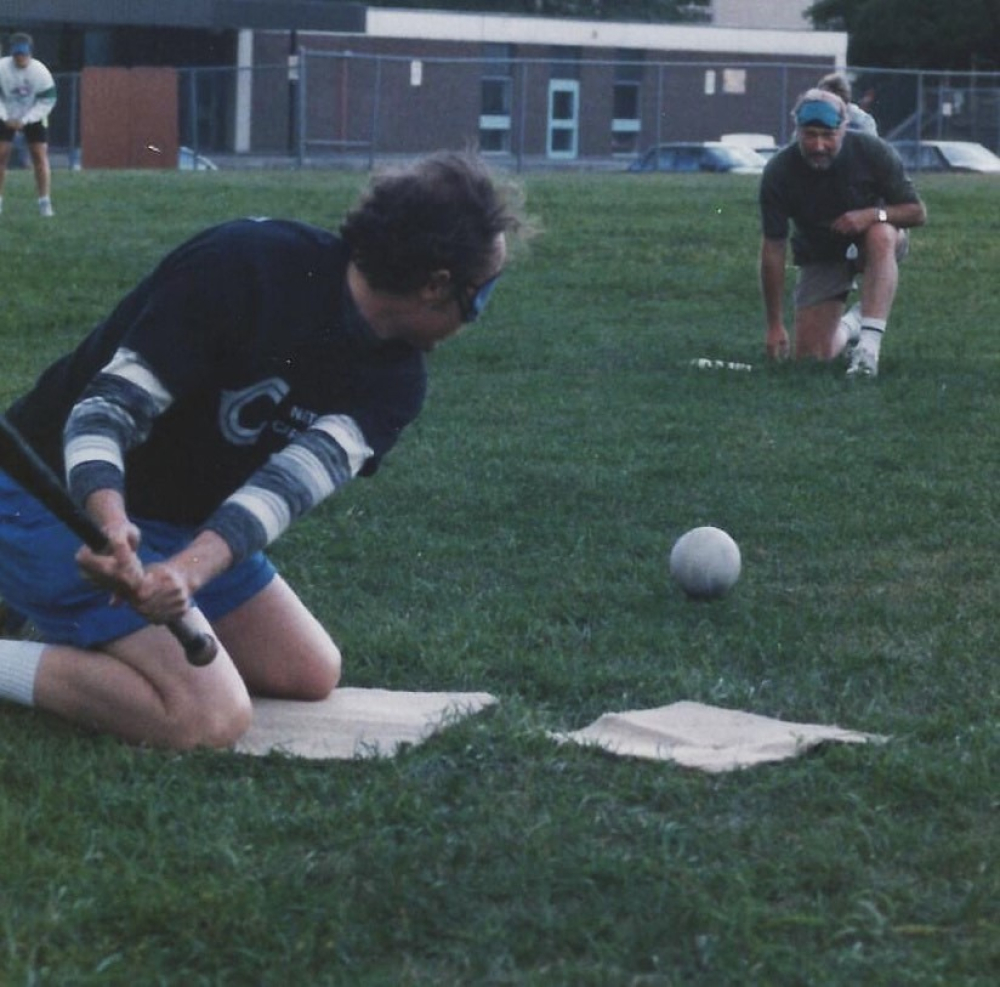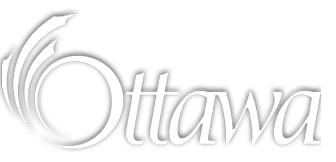David (Dave) Kent - Beep Ball, Disability, and Sports Memory in Ottawa
In March 2024, the Historical Society of Ottawa sat down with David (Dave) Kent to discuss beep ball, disability and sports memory in Ottawa.
Why don’t we start by telling a bit about yourself and your life?
Dave: Well I was born in Ottawa in the summer of 1951 and did almost all of my schooling, elementary, middle and high school in Ottawa. I went to the University of Ottawa in the early '70s and did an arts degree in Geography. I then went to the University of Manitoba to take a course in data processing, or what they call computer science now. I had normal vision until I was about 8 or 9, when I lost 90% of my sight.
And what was it like attending public school with a visual impairment?
Dave: In the 1960s, it was normal for any kid with any difference to be sent off somewhere, like the Ontario School for the Blind in Brantford or similar schools for deaf children. There were also sunshine classes for the kids in wheelchairs. My parents wanted me to stay in the public school system in Ottawa because they knew I’d have to adjust to this anyways. But there were no organized supports, it often depended on what the teacher thought they could do to help. Sometimes my teacher might copy a test from the blackboard onto paper for me or use the sideboard instead.
The program I took at the University of Manitoba was supported by the CNIB (Canadian National Institute for the Blind) and the governments. I think it was called Data Processing for the Blind. The reason I took the course, even though I already had a Bachelor's degree from the University of Ottawa, there weren’t any jobs at the time. So I now worked 35 years in what became information technology, 7 years for the Federal Government and 28 years for the City of Ottawa in their IT team, designing programs and databases. In about 1980, I met my wife. We’ve been together 40 years now and have six kids. We also have a cat named Tintin. So that’s the 5 minute biography.
So can you explain to me what exactly beep ball is and how you became involved? I think I have an idea from my Google searches but I’m not sure.
Dave: So beep ball or beeping baseball has its origins in the US, probably in the early '60s. The culture in the US was that there was really only one sport: baseball. The NFL, NHL, and the NBA were just fledgling organizations. The only real sport was baseball, “America’s game” or “America’s pastime.”
There was a group of former Bell telephone employees called the Bell Pioneers, and they believed every boy in America should be able to play baseball. So they created a baseball the size of a softball with a pin, and inside there’s a device that beeps. When you pull the pin out it starts beeping, and when you put it back in it stops.
In the US, it’s played by someone throwing the ball in the air to a blind batter, hitting it, and then running to a beeping base. That isn’t quite the way we played. We played the more traditional version where the batter would be blindfolded, with six fielders, also blindfolded, but the pitcher and the catcher were sighted. The pitcher would pull the pin to make the ball beep, he or she would say “ball coming” and then roll the ball across the ground. The batter would be kneeling, and sweep their bat across the ground to hit the ball.
The batter would start running towards first base with the assistance of a guide. In the field, when the ball was caught, that ended the play. If the batter made it to the base, they were safe. If they were caught between bases, they were out. Beep ball was also played on grass rather than a baseball surface because quite often, you’re on your hands and knees crawling around and such. In 1992, Maclean-Hunter, a Canadian cable company, actually did a ten minute video for us, so we have that on VHS.
How I became involved was that my wife's father was actually working for CNIB in 1986. At the time, CNIB was trying to put together a summer activity program for their client base. They had a fellow called Murray Thorpe, and he decided to start a beep ball league for the clients with the idea that it promotes physical and social activity. There was a real concern amongst the blind community about physical activity, and of course, blindness can be socially isolating.
So that’s how I first got involved.
How often did you play?
Dave: We used to play on a weekly basis. At the time, there was actually a beep ball tournament in Belleville, and we ended up winning the first couple of years.
After that first summer, the group of us who met one another through beep ball continued to play for the next few years. In 1990, Ottawa was part of the Twinning Games, which involved an exchange of athletes between Ottawa and The Hague. The people from The Hague came here and we wrote to the City of Ottawa saying we’d be interested in meeting some of their blind athletes. A group came over who played Showdown, a game very much like air hockey. If you saw it and didn’t know what it was, you’d think they were just playing air hockey. So it worked out really well because both cities were worried about finding a group on either side who could accommodate their needs.
In 1991, Ken McColm was walking across the country. He was a blind fellow walking across Canada for diabetes because that’s how he had lost his sight. When he got to Ottawa, I got in touch with the Diabetes Association and we put together a beep ball exhibition game against the CJOH NoStars on the main lawn of Parliament Hill. The Diabetes association then asked if we’d be interested in running a tournament next year. This was at a time when Hope Volleyball was really big, so we wanted to create a beep ball tournament. In 1992, we had B.A.T., the Blind Awareness Tournament on Parliament Hill with four teams. In 1993 we had eight teams. In '94 it was 16 teams and we moved to St. Paul’s University. We then got too big for people to run this part-time, so that was the last of the B.A.T. tournaments, but we continued to play after that.
In the city at the time there was a blind sports club called the Capital Eyes, so we used that pun. As the Capital Eyes we were part of the Ottawa disabled sports club, we even had our own shirts!
What other activities did you participate in? Did you engage in politics at all?
Dave: Apart from our normal play, we used it for reverse integration, so we’d take the equipment to schools, guide meetings, and offices to play with sighted folks. This really was reverse integration and it gave those people a chance to see what it would be like to not see or have to rely on other people.
We didn’t do any political lobbying, we were more recreational. But we did have various people come out to see us, like the head of Baseball Canada. We wanted them to know that, hey, we’re out here too and we’re playing too. He had never heard of beep ball, he was fascinated. During one of our tournaments we also commissioned the Dominion Carillon player Gordon Slater to play Take Me Out to the Ball Game on the Peace Tower Carillon.
Throughout your career, have you seen any changes in the way people discuss disability?
Dave: There was certainly a change in attitude between elementary school and high school, and when I got to university. When I went to university, the only thing people cared about was if you could do the work.
When I first entered the workforce there was a reluctance or a concern about hiring an individual who was blind. They were concerned about if you could do the job, so you had to prove you could do it before their concerns were alleviated. I found the people I was working with very supportive. But if you interviewed with people in other organizations, the first thing they’d realize was that this guy has a problem, and did they really want to invite a problem into their workplace. So I suspect I may not have gotten some jobs over my life because of their lack of vision, not my lack of vision.
There were no accommodations when I entered the workforce in 1975, everything was print based, so at one point I did have a manual sent off the CNIB to enlarge it. But really no special accommodations. I’ve now been out of the workforce for 13 or 14 years so I can’t really talk about the present day. Certainly technology has changed a lot. There's a lot of accessibility features built into devices that didn’t exist most of the time I was working.
Listen to Dave explain the origins of beep ball and how it's played in Ottawa.
And, in this linked video, Dave shows us what a beep ball looks and sounds like.
Learn the Beep Ball - Rules of Play.
Further Reading and Resources:
- About the CNIB: https://www.cnib.ca/en?region=on
- About the Bell Pioneers: http://www.telecompioneers.ca/pioneer-links/bellaliant
- Get involved with Ottawa’s Miracle League: https://www.miracleleagueofottawa.com
- About Diabetes Canada: https://guidelines.diabetes.ca/about
-
About Hope Volleyball Ottawa: https://hopehelps.com






